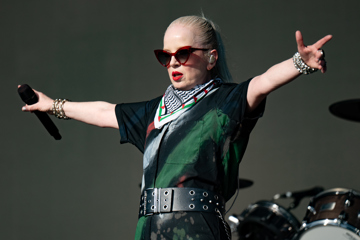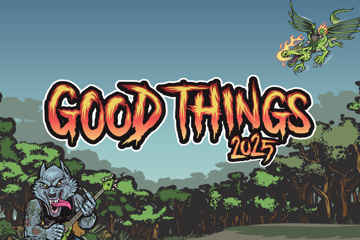Tell Trump: 'We Are Humans... We Have Our Dignity'
"We, as people in the world, need to respect every country, every culture, every community, every reality. He doesn't have the right to say that."
"I feel like an ambassador for Africa, for Senegal. These are places that people don't know well in the western world," says Youssou N'Dour. The 58-year-old singer, born and raised in Dakar, is a legend in African music, having performed since he was 12 and toured since 14. He found fame, at home and abroad, with his 1986 LP Nelson Mandela, which led to collaborations with Paul Simon, Peter Gabriel, Neneh Cherry and Dido. His single with Cherry, 1994's 7 Seconds, hit #3 in Australia and the UK, and #1 in France, and remains beloved to this day. "When I play, I do a lot of new material, but there are certain 'classic' songs - 7 Seconds, Undecided, Birima - that I have to play," N'Dour says.
Being one of the world's best-known African musical exports, N'Dour has always felt as if he has to represent Senegal, and Africa as a whole, on the global stage. "A lot of people in the west, they think Africa is only war, only AIDS, only Ebola, only poverty," he says. "But Africa is many different people, many different cultures, lots of great culture, great music, great arts. Africa is doing very well... I feel our culture is at its richest. We are making a new Africa. Not only a place of difficulties, but one of positivity."
It's hardly surprising, then, that N'Dour was duly horrified by the President of the USA's recent racist dismissal of African immigrants as hailing from "shithole countries". "The world doesn't need to know what Donald Trump thinks about Africa. We don't need to hear that," N'Dour spits. "We, as people in the world, need to respect every country, every culture, every community, every reality. He doesn't have the right to say that. We need to make our voices, from Africa, louder than his. I would say: Africa has dignity, Africa is storied, Africa has made great contributions to humanity. [Trump] has no idea what is happening in Africa. If he's visited Africa, he's probably just come for one day, to see the animals in Kenya, do safari or something like that. He's never visited the people in Africa. The people in Africa are rich with stories, rich with culture. They have had to forgive so much, for slavery and colonisation. But now, we want to grow stronger, to move forward. Tell him, tell Donald Trump, that we are humans, that we have our dignity, and he has to respect that."
N'Dour sees music as an important part of cross-cultural exchange. "Music is the first language, the original language," he offers. "You can use it to talk to people all over the world. With music you can communicate a message, you can change how people feel, what they think."
Don't miss a beat with our FREE daily newsletter
N'Dour's last full tour of Australia came back in 2004; since then he's issued a pair of classic LPs, 2004's Egypt and 2007's Rokku Mi Rokka, and seven LPs in total. Although it's been 14 years between Australian tours, N'Dour still harbours fond memories of previous trips, connecting with local Indigenous communities. "A big part of coming to Australia, for me, is [engaging] with the Aboriginal people. It's great meeting people in a big city like Melbourne, but it feels important to me to go out and meet people in Aboriginal communities."
This is, to N'Dour, just another example of music's potential to "unite people from different cultures". In recent years, he's turned that idea into a political position, being appointed in 2013 as 'special advisor' to Senegal's president, his role to promote Senegal abroad (his first scheduled interview time with The Music had to be waylaid, in fact, after he ended up stuck in a presidential meeting).
"I'm not trying to become a politician, to enter into traditional political life. I just want to be involved in change, in social movement," N'Dour says. "What's happening in society is something that concerns everybody. If you don't act when you have the chance to act, you're never going to have a just society. I love my country and, through my experience and success, I have connections, and I can help... Now I'm in the position to give back to my country, I try to give back."







